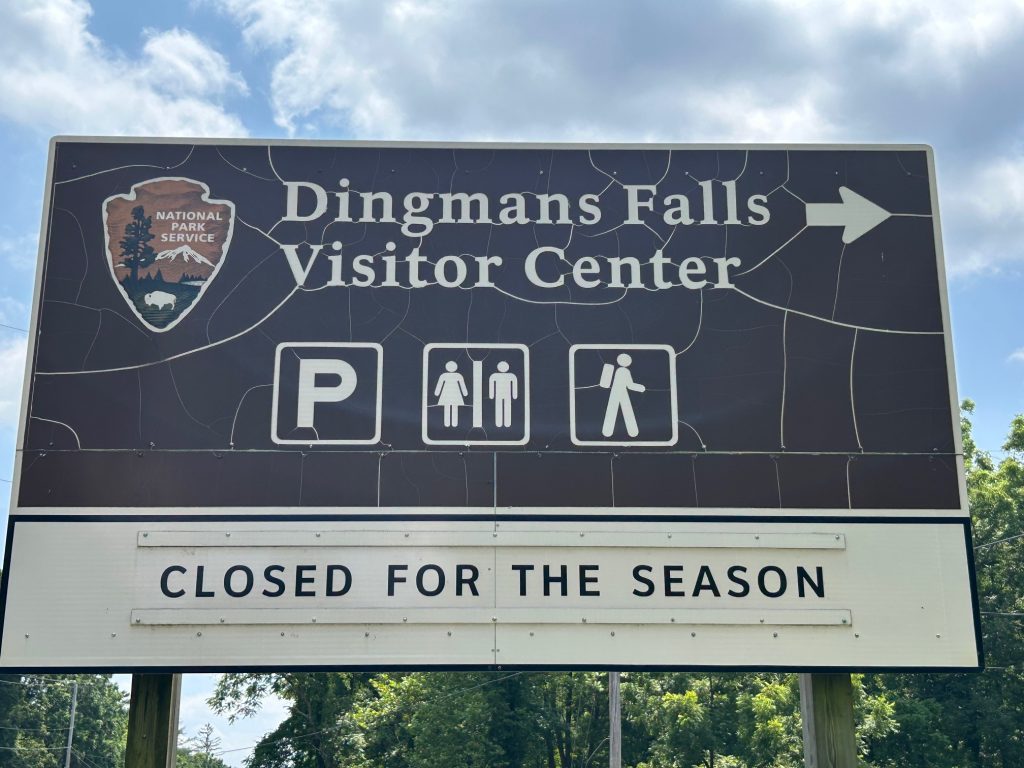
Advocacy group warns of grim future for Delaware Water Gap National Recreation Area
| July 24, 2025
An advocacy group warned that current and pending cuts in National Park Service staff and funding will harm visitors’ experiences, degrade facilities and risk public safety at the Delaware Water Gap National Recreation Area.
The group, the National Parks Conservation Association, last week hosted a webinar, “Building Advocacy for the Delaware River,” that explored how cuts under the Trump administration could ripple through the recreation area, which straddles Pennsylvania and New Jersey and drew more than 4 million visitors last year.
Permanent staffing overall at the Park Service has dropped nearly 25 percent since January, while hiring for summer and fall seasonal positions has lagged. Such losses, particularly among senior staff members, represent a brain drain that could have “generational consequences,” said Edward Stierli, the Mid-Atlantic senior regional director for the association.
He said the Trump administration’s $1 billion reduction in the Park Service’s budget amounts to the largest cut in the history of the agency. “There has never been a more important time to advocate for national parks,” he said.
Editorial: National Park Service budget cuts are shortsighted and counterproductive
Impacts on Delaware River Gap National Recreation Area
Renee Reber, Mid-Atlantic Climate and Clean Water program manager for the association, said the DWGNRA has slowly seen an erosion of its staffing by 20 percent over the last 15 years. She described the recreation area as “challenged, underfunded and understaffed.”
In the past six months alone, the area’s staffing dropped to 70 employees from 107. She described the staff as “pretty strapped to begin with.”
Though it was not immediately clear which positions have been hit the hardest, association officials raised concerns about what the cuts will mean for visitors, their safety and the maintenance of facilities.
Association officials credited Park Service staffers with being dedicated public servants and for trying to make the best of a challenging situation. Stierli described them as the “people behind the scenes who help to keep the parks open and thrive.”
Still, the cloud of job insecurity looms large among them. “They’re coming to their dream job every day and they don’t know if they will have a job tomorrow or next week,” Reber said.
Another round of layoffs, a so-called reduction in force, could happen at any point, Reber said. “The park is already stretched to the max,” she said. “We don’t know yet what is yet to come.”
Apart from the day-to-day tasks, like picking up trash and making sure restrooms are properly stocked, carrying out larger projects, such as filling potholes or fixing landslides, will be even bigger challenges.
Parks can have areas of expertise clustered within them. In the case of the DWGNRA, it has specialists in geology, because, as Stierli noted, sinkholes “are an everyday occurrence” in the area.
“The fact that these are the positions they are targeting is absolutely mind-blowing to us,” he said.
Kathleen Sandt, the longtime spokeswoman for the DWGNRA, left her job at the end of May. Doyle Sapp, who had been the superintendent of the recreation area, retired from the Park Service four months ago after a 32-year career.
Dani B. Cessna, chief of Interpretation, Education and Partnerships at the recreation area, said in an email: “The National Park Service is focused on ensuring that every visitor has the chance to explore and connect with the incredible, iconic spaces of national parks, including Delaware Water Gap National Recreation Area. Our teams are dedicated to meeting the evolving needs of our visitors, ensuring memorable and meaningful experiences for all. Visitors are encouraged to plan ahead when considering a park visit and consult the park website for updated information and tips.”
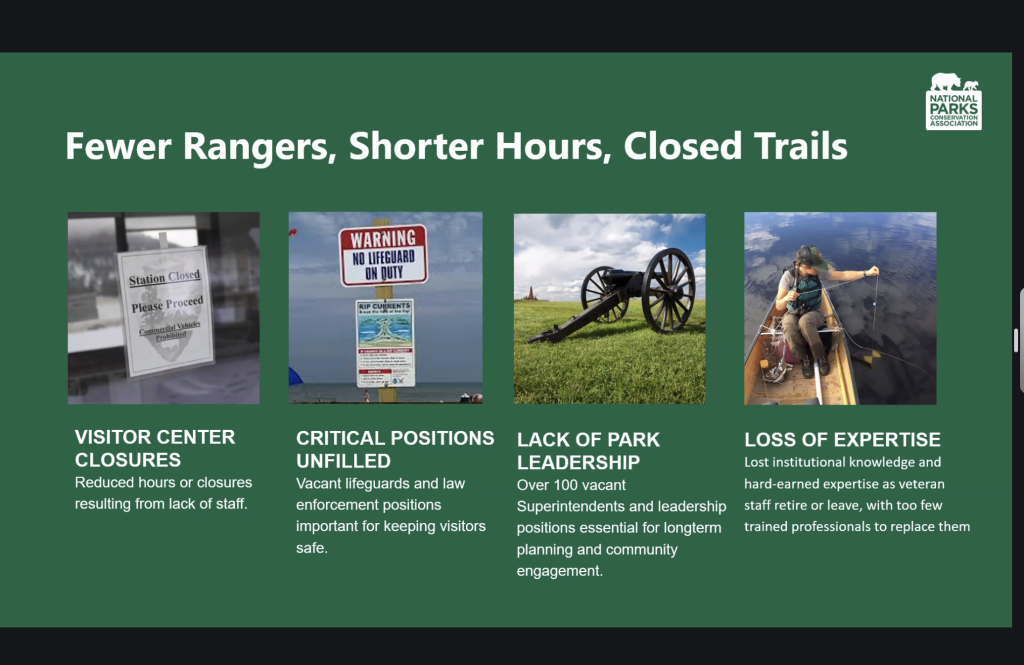
Parks get the glory
The national park system covers 85 million acres at 423 “units,” including 136 historical parks or sites, 84 national monuments, 63 national parks, 31 national memorials, 25 battlefields or military parks, and 84 otherwise designated national park units.
Nationally, the Park Service reported a record 331.9 million recreation visits in the calendar year 2024.
Apart from the Delaware River Gap National Recreation Area, there are 10 other Park Service units in the four-state Delaware River watershed, ranging from Independence Park to Valley Forge to Hopewell Furnace, in Elverson, Pa.
Not all are necessarily national parks. Some are wild and scenic rivers, some are national historic sites or national historic trails, for example.
Outside of the Delaware Water Gap National Recreation Area and along the river are two other Park Service units, the Upper Delaware Scenic and Recreational River and the Lower Delaware Wild and Scenic River. Stierli said that cutbacks in one unit can have ripple effects on sister units along the Delaware.
He added that units designated as national parks garner the glory and prestige, while other sites managed by the Park Service tend be to overlooked or seen as also-rans.
“If you’re a unit of the National Park Service that does not end in quote ‘national park,’ you are not worthy of being considered one of the crown jewels of the NPS,” he said.
Jayda Hayman, the Delaware River field representative for the association, urged members of the public to contact their elected representatives and speak up on behalf of the Park Service. Among the points she emphasized: park funding should be valued and parks should be protected.
“There’s no plan here,” Stierli said. “I think it’s been a lot of ‘ready, fire, aim.’”
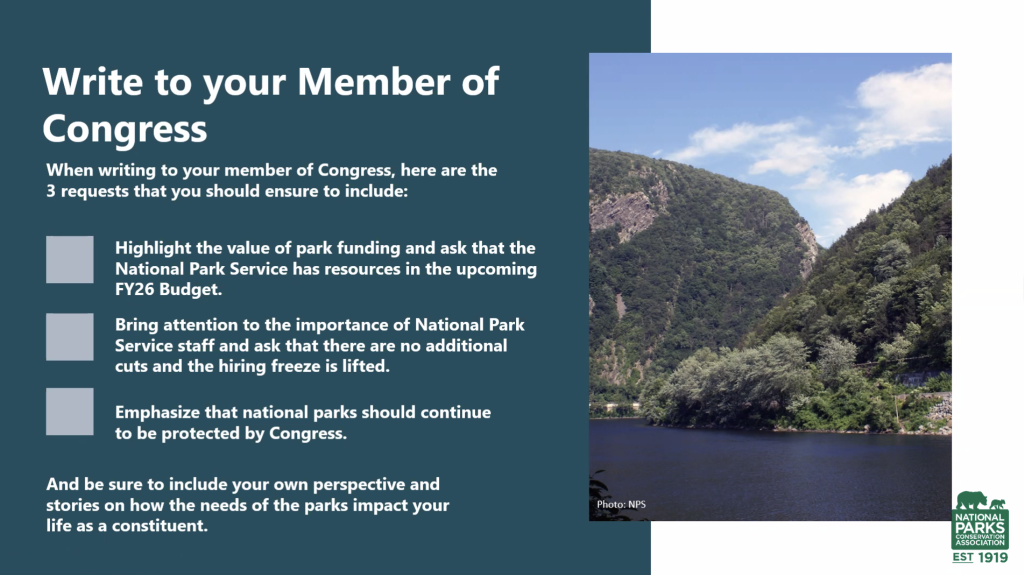
How to reach your elected officials
Delaware
- Senators
- Representative (At Large)
New Jersey
- Senators
- Representatives
- Representative Donald Norcross (1st Congressional District)
- Representative Jefferson Van Drew (2nd Congressional District)
- Representative Herb Conaway (3rd Congressional District)
- Representative Christopher H. Smith (4th Congressional District)
- Representative Josh Gottheimer (5th Congressional District)
- Representative Thomas H. Kean, Jr. (7th Congressional District)
- Representative Mikie Sherrill (11th Congressional District)
- Representative Bonnie Watson Coleman (12th Congressional District)
- Representative Donald Norcross (1st Congressional District)
New York
- Senators
- Representatives
- Representative Patrick Ryan (18th Congressional District)
- Representative Josh Riley (19th Congressional District)
- Representative Elise Stefanik (21st Congressional District)
- Representative Patrick Ryan (18th Congressional District)
Pennsylvania
- Senators
- Representatives
- Representative Brian K. Fitzpatrick (1st Congressional District)
- Representative Brendan F. Boyle (2nd Congressional District)
- Representative Dwight Evans (3rd Congressional District)
- Representative Madeleine Dean (4th Congressional District)
- Representative Mary Gay Scanlon (5th Congressional District)
- Representative Chrissy Houlahan (6th Congressional District)
- Representative Ryan Mackenzie (7th Congressional District)
- Representative Robert Bresnahan (8th Congressional District)
- Representative Daniel Meuser (9th Congressional District)
- Representative Lloyd Smucker (11th Congressional District)
- Representative Brian K. Fitzpatrick (1st Congressional District)


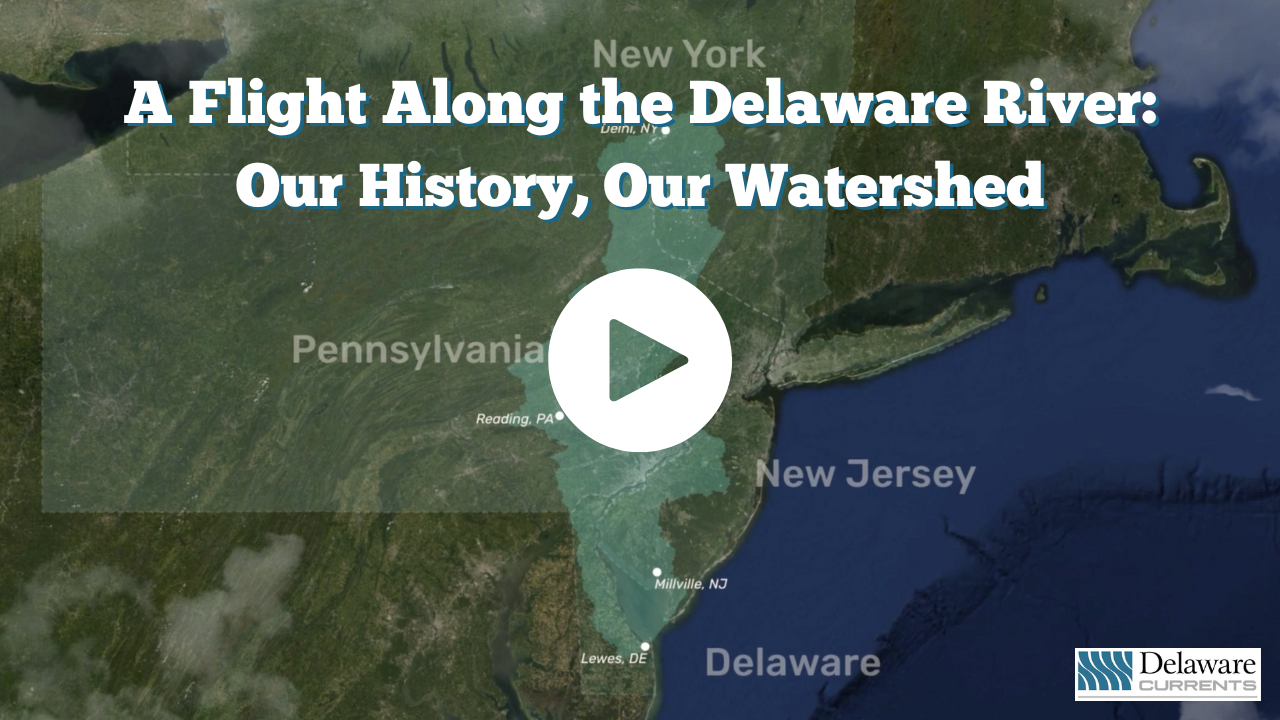
![DC_Image [Image 4_Assunpink Meets Delaware] meets Delaware The Assunpink Creek on its its way to meet the Delaware River. The creek passes through woods, industrial and commercial areas and spots both sparkling and filled with litter.](https://delawarecurrents.org/wp-content/uploads/bb-plugin/cache/DC_Image-4_Assunpink-meets-Delaware-1024x768-landscape-14f069364113da5e8c145e04c9f2367c-.jpg)
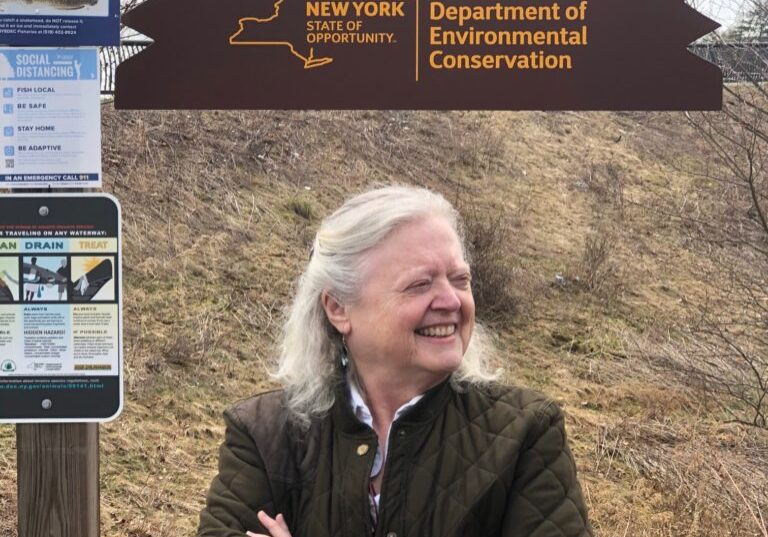



DEWA was the 17th most visited unit in the NPS system.